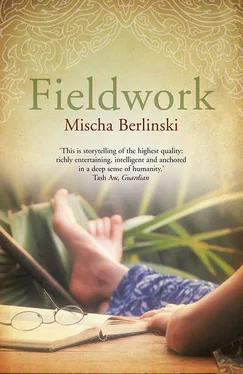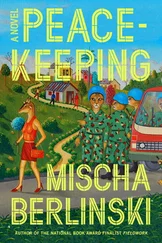Still, I thought I recognized the place. There were the other roofs, of woven cogon grass. There was the cooking hut. Pigs rooted between their stilts, and chickens squawked nervously under bamboo baskets. Gray, mean-looking dogs with yellow eyes barked at us. A few women wearing the famous Dyalo costume — the low trailing skirt and the brilliantly colored tunics — threshed rice into wicker baskets. Small naked children, brown and lean, stopped playing as we came through the village, but only for an instant: I could have been any Western trekker on holiday.
It had been more than a decade since Khun Vinai was last in Dan Loi. The familiar huts were full of strangers. The headman who had consoled Martiya on the loss of Pell was dead. The woman in his hut knew him only by name. Miss Dan Loi, once the prettiest woman in all Dan Loi, had moved with her husband and their children to a new village; they left no forwarding address. This was no surprise: the Dyalo are wanderers, and it is rare for a Dyalo family to stay in the same place for very long. George Washington had died three years before, the oldest man anyone in the village had ever seen. I began to wonder, wandering through the village, whether Martiya had ever been here at all.
But Lai-Ma and Farts-a-Lot were just where Martiya had left them.
Does one shake hands when introduced to a Dyalo stranger? Bow, as in Thailand? Dance a jig? I had no idea, and so I stood there with an embarrassed half-smile on my lips, moronically shaking my head up and down. Lai-Ma and Farts-a-Lot! I had hardly believed that they existed, and now they were in front of me: Lai-Ma, a small, wrinkled creature, barefoot, in a magenta tunic, her hair wrapped in a headband; and Farts-a-Lot, smaller than I had imagined, and with a sweetness to his lopsided, toothless smile that I hadn't expected from Martiya's letters. Lai-Ma and Farts-a-Lot had a habit I recalled from my grandparents: one began a sentence, and then the other finished it. They were like a pair of garden trolls come to life.
We climbed up the shaky stairs and sat on small stools. The hut was dark and low; it smelled of smoke, sweat, incense, and chili powder. The place kept cool even now in the heat of the day. From a line suspended diagonally across the large room hung the family's wardrobe: a few shirts, a pair or two of black cotton trousers. On the wall there was a calendar from 1997 with pictures of the mother of the king of Thailand. And not much more, really: a hoe, a large covered cistern, some smaller jars, a bamboo mat rolled and propped against the wall, a few blackened cooking implements, and a row of bottles filled with rice whiskey.
"Was this the hut Martiya lived in?" I asked Khun Vinai. "When she first came?"
Vinai said something to our hosts which made them laugh. He turned back to me and said, "Yes. Right there." He pointed to a patch of uneven floorboards near the far wall. Martiya had slept in that corner for almost a year, unrolling her mat at night, leaning cross-legged against the wall during the day as she transcribed her field notes.
Then Lai-Ma said something which provoked a response from Farts-a-Lot. Khun Vinai sat up straight. It was also in that corner, he said, that Martiya lived at the end, when she had no place else to go.
Lai-Ma and Farts-a-Lot spent hours telling their story. Occasionally, Khun Vinai would remember that I was there and summarize ten minutes of animated conversation in a sentence or two: "People were afraid to be Adam-people with David gone. People quit the church."
Then I would ask, "Who quit the church? Did so-and-so stay a Christian?"
This would provoke another half hour of urgent conversation, at the end of which Khun Vinai would say, "No, so-and-so didn't stay a Christian."
"Why did he quit?"
And the cycle was repeated.
The four of us spent most of the day like that. At one point, I leaned up against the southern wall of the hut. This produced an anxious moment. Farts-a-Lot said something to Khun Vinai, who said, "Don't touch that wall."
"Why?" I asked.
Translation. Back and forth. Waiting.
"He says it makes the spirits angry," Khun Vinai finally said.
A trio of young boys from a neighboring Karen village, fishing for river shrimp, found David Walker's body. Their parents informed the police. A squadron came through Dan Loi, and then several hours later passed through the village again, carrying the bloated corpse on a stretcher.
And then there was nothing. The villagers had seen the body and that was all the information they had: there are no newspapers in the mountains, no journalists. At first, they assumed that David's death was an accident: an old bridge had collapsed. No one knew what this meant. The sight of David's body being borne on a palanquin through Dan Loi village had frightened the Christians. If not even David Walker — who presumably knew how to please Ye-su-tsi in ways infinitely more sophisticated than they did — could keep a terrible death away, just how strong was this tsi ?
But from the shaman, George Washington, Lai-Ma heard a more disturbing rumor: that David Walker had been shot.
The rains were heavy that year, the harvest was meager, and not long after Lai-Ma and Farts-a-Lot had emptied their baskets into the rice barn, the structure collapsed. Big Teeth's opium crop was half what he had hoped: he would be forced to buy his youngest son an ugly bride. Bad luck pursued Christian and heathen alike. Pastor James, who before his conversion was called Fat Belly, lost two pigs in the jungle. Garlic Breath was stricken with diarrhea. Two children died that winter, one by drowning, the other of a mysterious fever.
The deluge was followed by bitter cold. At night, the water cisterns froze over, and even at midday, in the exceptional clearness of the winter light, the villagers could see their breath. Villagers reported nightmares, animals acting strangely. Wives complained of bad-tempered husbands, and husbands lamented volatile wives. No one could explain it, but the communal cooking hut began to stink — as if something had died and was rotting in one of its corners. No one could find the offending object. Food cooked in the hut was generally agreed to have a bad taste.
Pastors Moses and James read from the pulpit, the congregation sang. But the church had registered its last convert, and its flocks began to thin.
They left for any variety of reasons. Stupid Squirrel had converted chiefly in the expectation of saving money: with a family as large as his, he had been forced to buy pigs frequently to sacrifice. Seeing that the Christians made do without any sacrifices at all, he had converted. But he hadn't reckoned on the Christian ban on opium planting: a man is hardly called Stupid Squirrel for no reason, after all. David had a particular genius for framing these dilemmas within the grand context of biblical history, but, of course, David was gone.
Another who succumbed was Miss Dan Loi. Miss Dan Loi had joined the church chiefly to avoid the dyal : just as Martiya had always suspected, some women in the village found that rite a horror. Even seven months after David was dead, she had remained steadfast in her faith, planting with the other Christians, praying over the fields. But as the first seedlings sprouted, Miss Dan Loi and her husband noted a deformity in their harvest. Miss Dan Loi hated her duties in the dyal , but clearly Rice wasn't happy, and if Rice wasn't happy, she knew, her children would go hungry. In the old ways, the Dyalo had known how to treat such problems: how to feed the deformed Rice glass after glass of whiskey, and trap the drunken spirit in a bamboo cage. If David had been alive to lead them in the appropriate Christian prayers, she and her husband wouldn't have needed to turn to George Washington — but with David gone, what choice did they have?
Читать дальше












